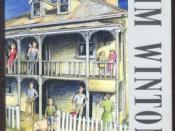Values and attitudes surrounding Australian life in
'Cloudstreet'
Cloudstreet by Tim Winton is an intriguing insight into the lives of two families living in Western Australia during the middle of last century. The challenges and ordeals faced by the Lambs and the Pickles place the reader in a position to observe varying values and attitudes which are connected with many aspects of Australian life. The text deals with the values and attitudes surrounding work and employment; the water; the role of women; gambling; language; family and sense of place in such a manner that relays typical assertions of the time in which the novel was set, and indeed of this time now.
Australians are renown for being hard workers, and the characters in Cloudstreet proved to be no exception. The text indulges in the view of hard working Australians, as most characters hold down stable jobs. The Lamb's own a family business which members like Quick worked for unpaid; Sam Pickles had the use of only one hand but still held down a job, working at the mint; Rose Pickles quit school to work and provide for her family; and boys from both families left home, not to travel the world, or experience freedom, but to find jobs, to work, and to discover their independence through the work force.
Quick felt pride in bringing home money from his policeman's job to provide for his family, just as his father had done when he was a child. To this day, work gives Australians a sense of achievement, and Winton's inclusion of work as such a stable and rigid issue emphasises the attitudes which are associated with the working Australian- not afraid to get their hands dirty and never too proud if it means putting food on the table.
Be it the river, the ocean, or the beach, water gives Australians, (and in particular West Australians who live close to the coast) a sense of placement and direction. In Cloudstreet the strong connection which Fish Lamb felt with water can be likened to that which people who grew up with the water as their playground feel. Winton's strong imagery in Cloudstreet includes visions of jetty jumping, family picnics by the river and fishing trips- elements of Australian life which are priceless and inexplicable to those who have not experienced them for themselves. Water is presented in the novel as a form of recreation, spiritual enlightenment and a perpetual factor which reminded many characters of their past. Aside from Fish's near death experience, water is always described in the novel as a pleasant place to be. 'The water' was a quiet salvation for Quick to go fishing, a place which Fish yearned for, the location of Quick and Roses' first romantic tendencies, a place for Rose and Wax Harry to bond, and more generally a place of discovery- discovery of death, life, love and bonding. The use of such emotions surrounding the topic of water leads readers to recognise what an important and peaceful part of Australian culture it is. Cloudstreet gives perspective as to why so many Australian people cherish the coastline- not only for its physical uniqueness, but also the emotional pacification which accompanies it.
Cloudstreet was set in the post world war two period of history, a time in which many people still felt strong military connections. Men who had fought for their country were deemed heroes, and this era placed importance on RSL clubs and ANZAC days. In Cloudstreet, the Lambs were very particular over the subject of war, and there was a sense of pride that Oriel's brother and Lester had both defended the country. To this day, Australians hold a special gratification to those who have been involved in any form of war. Defending one's country is still regarded as a duty worth the highest of honours. Oriel Lamb was a women who made certain people were duly recognised for their time in war, but was quick to judge those who advertised their feats (such as when rival shop owner G M Clay publicly proclaimed himself as a war veteran). This is an indication of the Australian attitude that one must do what they do for nothing more than personal satisfaction, and to hold oneself above others because you have served your country is seen as degrading to those who have served their time and received little or no recognition. Cloudstreet expresses the importance and impact of any war, not just World War II, on the Australian people. Those who served in it (such as Lester), those who died in it (Oriel's brother); those who were brought up in it (Quick lamb, who had little understanding about the fighting); and those who were simply glad when it was all over (such as Sam Pickles). All of these characters felt the effects of war in one way or another, and their lives were changed because of it, much the same as actual people who really had to face the harsh realities of war and the resulting changes in their lives and the lives of generations to come.
Throughout history, the role of women in society has been ever-changing. Cloudstreet deals with the role of women after a period of war. War gave women the opportunity to take part in the workforce, as the men were abroad fighting for the country. This induction saw women take on jobs that were previously specified for males. In Cloudstreet Oriel Lamb nurtured this transformation- she evolved to be the backbone of the family, likening to the father figure or male influence. For the sake of literature the role of males in Cloudstreet was played down, and characters such as Lester Lamb emerged as timid, and possibly more feminine than his wife. This contrast displayed the extremities of change in the traditional gender roles of society. Dolly Pickles was the opposite of Oriel, posing as a disorderly drunk who showed no care for herself, her family or her surroundings. Dolly took on a typically 'abusive male' approach to life. This not only signified the role reversal which had become prominent in society of the time, but also aided in displaying the dawning diversity of women within that era... Some worked for a living, others stayed home to keep house, and then there were the emerging few who drunk excessive amounts of alcohol, smoked a similar amount of cigarettes and indulged in adultery. Cloudstreet contained prime examples of not only the changing role of women in society, but also the changing role of men and the blurring of the line between male and female cultures. In society today, half a century on, the role of women has further progressed along the line which was exposed in Cloudstreet. The era of Cloudstreet set the standards for the second half of the century, and gave women the liberation to succeed in any way they desired, shaping the nation's views of women to leave the genders now as notoriously equal.
Gambling in the Australian culture is often not seen as such. Sam Pickles did not spend his paychecks at the casino, playing the pokies or buying ludicrous amounts of lottery tickets. Instead, he preyed on the horse races, and made betting and the 'shifty shadow of luck' a large part in his life. Events such as the Melbourne Cup are seen as almost prestigious in Australia, and not many people bat an eyelid at the thought of placing a bet or taking part in a luncheon to signify such a prime event in the bookie's stakes. It may be assumed that this attitude to gambling goes hand in hand with Australia's attitude towards sport. Football tipping is just as acceptable as punting on the races, where as religiously playing roulette every week is not. The Australian culture frown upon gambling in its most exposed form of casino betting, but placing bets on the races, which can be just as degrading, is seen as acceptable. Cloudstreet shows the difference that 50 years has made to Australian society where gambling is concerned. Increases in resources and technology have lead Australians away from frowning upon the more traditional forms of gambling (such as betting on the horse races), and concentrating their discrepancies more on gambling which is not associated with sport or any form of enjoyment, but rather just winning money. Tim Winton expressed the evilness of Sam Pickles' gambling habit by displaying the severe consequences. The addiction not only broke down his family, but also became a costly obsession which left him conversing with undesirable people and in financial upheaval, at one stage leaving him no option but to vacate town until the situation was repressed. The contrast between Lester Lamb, who was not a keen gambler and felt remorse for indulging in the past time, and Sam Pickles, whose life revolved around betting, luck and 'the hairy hand of god' showed how people who could not afford to gamble were often the ones the wealthy people were making their money off. This is one issue that is not of the same cause of societal concern as it once was. Social conditions have evolved, and placing bets on horse races is no longer a common cause for concern. The lottery has turned into a beneficial factor for many organisations, and gambling in moderation is an acceptable part of Australian culture.
There is no doubt that Australians speak their own language, and Tim Winton has made sure to emphasize this in Cloudstreet. What is interesting about the colloquialisms is that they are seen as more relevant to the 'working class' of the time. The inclusion of Rose's suitor Tony shows the contrast between the speech of social classes. It must also be recognised that both the Lambs and the Pickles were not exposed to city upbringings and education, which may amount to their frequent use of what can only be described as poor grammar. Words such as 'carn' to replace 'come on' relay the verbal ironies in the book. By spelling the words as they are being 'pronounced' by the characters in the novel, Tim Winton has lifted his writing to another level. The dialogue in the book contains casual language, and because of this the informalities of Australian life have been exposed to or made more easily recogniseable by the reader. In fact, readers become involved with the language of the people, and can therefore relate to the characters in a more informal manner, pushing aside characterisation judgements and allowing the exposure to the tongue of yester-year help them comprehend situations which arise between characters in the novel. This gives the audience a sense of inclusion in the story and helps them to draw conclusion to the Australian manners of communication.
Many Australians hold the belief that family and sense of belonging are acquainted. Australia has a strong Aboriginal heritage that was only beginning to be recognised in the era during which Cloudstreet was based. In the novel, many characters and readers alike are constantly being unconsciously reminded that they are part of Australia, and Aboriginal people have connections with the land and people. When Europeans first invaded Australia the needs of the native people were not considered, and the Aboriginal people were treated in a disgraceful manner. Winton has tried to acknowledge this, and his Aboriginal characters are placed thoughtfully throughout the book. This is to remind other characters of their sense of tribal belonging, and the audience of factors concerned with Australian history- such as the stolen generation, Aboriginal people not being able to vote and the cruelty which was inflicted by past generations of 'white' Australians. The Aboriginal race became a harsh reality to some people who would have liked to believe that Australia's indigenous people did not matter. Through discrete teachings such as those in Cloudstreet, people can start to realise the true factors surrounding Australian history. The sense of family and 'tribal' belonging in the novel is displayed by the connection between the Lambs and the Pickles. This spiritual connection shows what the Aboriginal people have contributed to modern Australia, and the qualities for which the race of Aboriginal people should be recognised. Winton has presented a delicate subject in such a manner that presents both sides of the story and draws the subtle conclusion that Australia is not a nation of English settlers and tribal Aboriginals, but a country of all Australians attempting to function as one race.
Through his writing, Tim Winton has exposed people to values and attitudes that surround factors of Australian life. The novel Cloudstreet has addressed the issues, and subsequent values and attitudes, surrounding working; the water; the role of women; gambling; language; family and heritage to be concluded as a work of literature which deals with the Australian lifestyle in a typical manner. The values and attitudes surrounding the novel can often be called common to the Australian race of people, and this give all readers the opportunity to better understand Australian culture and the evolutions which have been made during the last 50 years.



Thanx
Wow! Long essay.. loved it though. I had trouble understanding Cloudstreet.. but this has helped me alot. Thank you
0 out of 0 people found this comment useful.